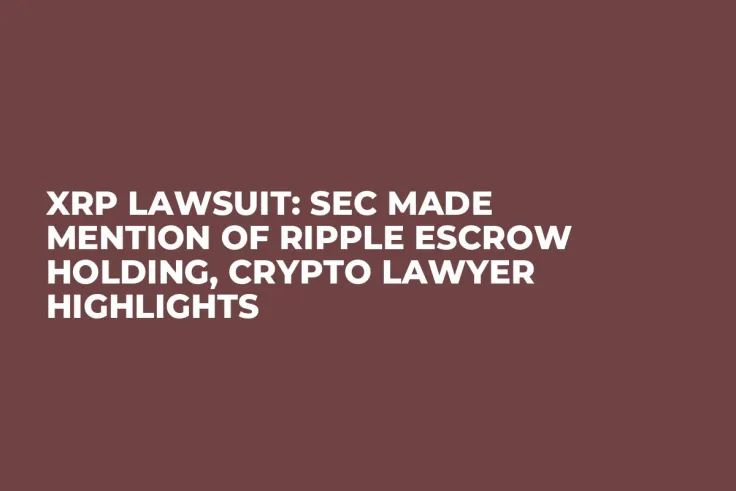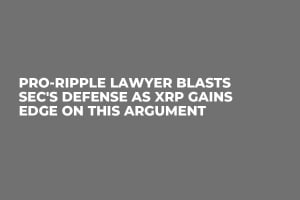
Disclaimer: The opinions expressed by our writers are their own and do not represent the views of U.Today. The financial and market information provided on U.Today is intended for informational purposes only. U.Today is not liable for any financial losses incurred while trading cryptocurrencies. Conduct your own research by contacting financial experts before making any investment decisions. We believe that all content is accurate as of the date of publication, but certain offers mentioned may no longer be available.
Crypto lawyer Bill Morgan has pointed out a part of the SEC's summary judgment motion wherein it talks about Ripple escrow. Morgan was responding to a Twitter user's question.
Morgan tweeted, "Yes, the SEC refers to the escrow to show common enterprise in its SJ motion. It is one of several steps it alleges Ripple took as good stewards of XRP to buttress XRP's price. The escrow account's purpose was to remind investors of the common enterprise XRP represented."
Yes the SEC refers to the escrow to show common enterprise in its SJ motion. It is one of several steps it alleges Ripple took as good stewards of XRP to buttress XRP’s price. “The escrow account’s purpose was to remind investors of the common enterprise XRP represented”. https://t.co/AZK9ARiJ11?from=article-links pic.twitter.com/EHXtkALaUN
— bill morgan (@Belisarius2020) May 15, 2023
According to Morgan, the SEC used Ripple's escrow to buttress its argument that XRP was a "common enterprise."
The screenshot of the SEC's defense reads, "In May 2017, with Garlinghouse and Larsen's approval, Ripple announced it would place 55 billion XRP into an escrow account that would release 1 billion XRP a month and to which Ripple would return any unsold XRP on a monthly basis."
The SEC went on to state that the escrow's purpose was to remind investors of the common enterprise XRP represented while making reference to Ripple co-founder Chris Larsen and CEO Brad Garlinghouse's supposed statements.
However, this remains different from Ripple's sole reason for launching the escrow. As stated by Ripple when it was introduced, "the escrow would be used to provide more predictability to the XRP supply."
It also highlighted its plans for the escrow to be used for on-ledger and cross-ledger atomic payments.
In 2017, Ripple locked 55 billion XRP (55% of the total possible supply) into a series of escrows. The escrow consists of independent on-ledger escrows that release a total of one billion XRP each month. This provides an upper limit on the amount of new XRP that can be brought into circulation.
As reported, CryptoLaw founder John Deaton slammed the SEC's defense, calling it "schizophrenic."
He pointed out the SEC's inconsistencies as it abandoned its earlier claims in favor of a new theory that XRP itself represents the common enterprise.


 Dan Burgin
Dan Burgin Vladislav Sopov
Vladislav Sopov